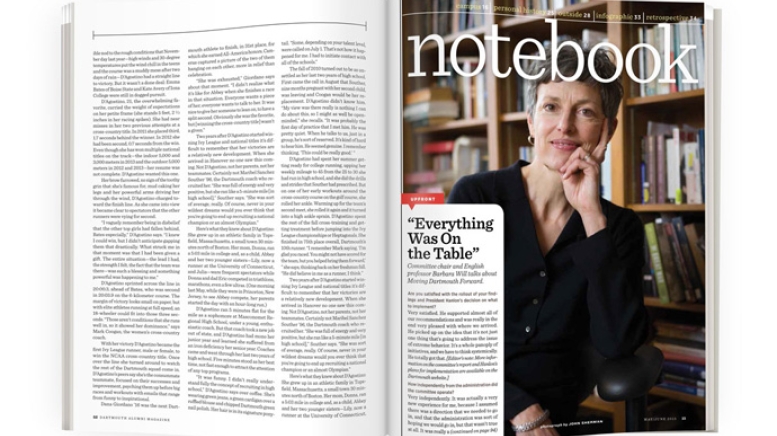Are you satisfied with the rollout of your findings and President Hanlon’s decision on what to implement?
Very satisfied. He supported almost all of our recommendations and was really in the end very pleased with where we arrived. He picked up on the idea that it’s not just one thing that’s going to address the issue of extreme behavior. It’s a whole panoply of initiatives, and we have to think systemically. He totally got that. [Editor’s note: More information on the committee’s report and Hanlon’s plans for implementation are available on the Dartmouth website.]
How independently from the administration did the committee operate?
Very independently. It was actually a very new experience for me, because I assumed there was a direction that we needed to go in, and that the administration was sort of hoping we would go in, but that wasn’t true at all. It was really a remarkable experience trying to figure out how to do what we felt was best for the College without guidance from the administration.
Who selected the committee members?
I was asked by President Hanlon to be chair of the committee, but I didn’t choose the members. The committee was given to me already made. I was surprised by that, but it ended up being fine.
What was most difficult about chairing the committee?
People don’t like change. This is something I learned anew. At the same time, there’s a national discussion going on right now about extreme behavior and student behavior, so people realize this is a moment to join that conversation. Although people don’t want change, they also don’t want things to stay the same because they recognize there is a problem.
How much did you find alumni to be in touch with what’s really going on here on campus?
The most recent alums probably have the best sense of the extremity of the behavior. Alums who are a couple of decades removed from the campus don’t realize how much things have changed. I noticed that the much older alums were the most progressive in their thinking because they were hearing things about Dartmouth that they didn’t recognize. They were shocked, and it was very troubling to them to hear the difference between now and when they were undergrads.
Was alumni input to the committee weighted equally with student input?
Everyone’s input was equal. But it’s not as if the input was then what ended up being our recommendations. We got input from as many different constituents as we could, and then we spent two or three months just digesting. We spent a lot of time weighing different opinions and evolving as a committee.
How would you characterize those discussions?
Feisty.
Was that good?
I woke up in the middle of the night with heart palpitations more times than I can tell you but, yes, feistiness was good. It was great. We evolved so much in our thinking about what was needed, and in some ways I think we evolved toward more realism. There are ideals out there and we would love to just wave our magic wand and change things, and then there are practical realities. We became much more practical and realistic as time went on.
How do you feel about Hanlon not adopting the recommendations about the D-Plan and all of the suggestions about improving diversity?
We felt the D-Plan was sort of a structural problem, and I think President Hanlon feels the same. The problem is that we don’t have enough residential beds to support a change in the D-Plan. We all agree on the problems with the D-Plan, but I would say in general he felt that was not something he wanted to tackle right now. The committee wanted to see more movement on the diversity initiatives, but [the administration] already has a lot on the table. I think they felt it was useful to get our input and we’ve been meeting with them separately since the recommendations came out to talk about diversity initiatives.
Will we at some point have enough beds and the logistics to resolve issues with the D-Plan down the road?
One trustee said to me that one of the jewels of the D-Plan is Sophomore Summer, and I agree with that. I think if you get rid of the D-Plan, you’re getting rid of Sophomore Summer. The problem is right now we’re not doing anything with Sophomore Summer, so it is a missed opportunity. If we kept the D-Plan but made Sophomore Summer a time when students could do a group project as a class, or some kind of service project, then I think you would have this really central moment during which a class could consolidate as a community. This might make up for other weaknesses in the D-Plan.
How seriously did you consider recommending more radical change to the Greek system?
We thought about everything. We considered keeping the Greek system just exactly as it is and not changing a thing about it, and we considered completely abolishing it. Everything was on the table.
How much concern did any committee members express regarding potential changes to the Greek system and their impact on donations from alumni?
I can honestly say that did not come into play at all. We were given the mandate to think as creatively and widely as we wanted to. When we asked questions about the financials of any of this, we were told not to worry about it.
As a long-time faculty member here, have you heard pushback from other faculty members about your committee’s recommendations for the Greek system?
No, I haven’t. Since the recommendations came out there has been very little faculty comment.
Any reaction to other opinions voiced on campus and in the media?
So far I think we’ve gotten very positive press. The only thing that has been troubling to me is that people see the hard-alcohol ban as if that’s the solution to the entire problem of extreme behavior. I encourage people to think about this as a package of recommendations.
The Wall Street Journal implied that the devil resides in the details, that specifics about the implementation of the recommendations will be critical.
I totally agree. But I think President Hanlon projects a seriousness about the future of these proposals, and I see that, in particular, with the quality of the group he’s asked to monitor progress of the plan. Those are serious people. That’s huge.
Is there any concern about the hard-alcohol ban deterring a victim of sexual assault from reporting it—because the victim was drinking hard alcohol?
Many things deter sexual assault victims from coming forward, and what we are hoping is that the benefits of the hard-alcohol ban, plus the benefits of a changed campus climate around reporting, would outweigh that kind of scenario.
Why did you recommend creation of a smartphone app—is that something that can combat extreme behavior?
If a student is in a compromising situation they’re going to have their phone with them. So if you have an app like Circle of Six, where you’ve got six friends who are always on call and know exactly where you are, it’s kind of like a monitoring system for friends. All you have to do is punch a button and your friends will know where you are and know that there is some situation that is difficult or challenging. I think you have to get in the mindset of people who always have their phones on them.
What is the committee’s stance on alumni returning for reunions—does the hard-alcohol ban apply to reunion tents?
We have no position on that. The committee’s intention is to keep hard alcohol out of the hands of undergraduates.
Did you get away from Hanover during the many months you served on the committee?
I went to Utah for two weeks in December and it was fantastic. I had a Zen experience. Nobody asked me what I thought about student behavior, and it felt great.
Would you encourage your son, now 12, to attend Dartmouth?
I certainly would now.




